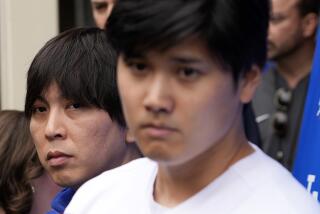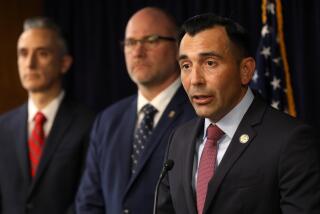NEWS ANALYSIS : Change Isn’t Word That Suits Miyazawa : Politics: For Japan’s premier, the summit’s timing has turned out to be disastrous. And Clinton appears to be favoring his opposition.
TOKYO — A month ago, Kiichi Miyazawa was looking forward to basking in the limelight of the economic summit before launching into a general election that would bring him a second term as Japan’s prime minister.
Instead, the summit is proving to be an elaborate demonstration of Miyazawa’s failure as a political leader and of the need for change in Japan.
To begin with, from the beleaguered Miyazawa’s point of view, the summit’s timing has turned out to be disastrous.
An unexpected vote of no-confidence by Parliament over his inability to implement political reform forced him to call a July 18 election for the lower house. And a poll released Wednesday by the Sankei newspaper showed his personal popularity at an all-time low of 6.7% and his party on its knees at just 15%.
To make matters worse, President Clinton, himself a symbol of change, appeared to be rooting for Miyazawa’s opposition.
Even before he arrived, Clinton declared last Friday that “the changes now going on in Japan, over the long run, (are) going to be good for the Japanese people and good for the American people.”
Arriving Tuesday, Clinton again spoke of the desirability of change. On Wednesday, he implied that Miyazawa would lose when he said that democracy is desirable because it enables countries to maintain close relations “despite changes in government.”
Asked by the traveling press if he intends to interfere in Japanese politics, Clinton responded, “Oh, no. I went out of my way to make it clear I was talking about economic issues, not the next election.”
Anthony Lake, the President’s national security adviser, explained that Clinton was talking not about the election but rather “the larger issue of change.”
But that issue has become the central one in Japan’s elections, as opposition parties call for more consumer-oriented policies of the kind that Clinton wants Japan to pursue.
“Clinton says we should work to improve our daily lives,” noted Koichiro Ichimura, a member of the planning staff of the Japan New Party, one of the most popular new opposition parties. “Those are the kinds of policies we have been promoting.”
Clinton’s endorsement may further erode Miyazawa’s position by offering a measure of reassurance to Japanese voters worried that a coalition made up of current opposition parties would hurt Japan’s standing in the world.
Miyazawa has sought to portray his party, which has ruled here throughout the postwar period, as the only one able to manage relations with the United States and the rest of the world.
“The fact that the American President looked positively on a change in government is important for us,” said Takenori Hanzaki, head of the foreign affairs committee of the Buddhist-backed Komei (Clean Government) Party.
Clinton’s arrival in the midst of a Japanese election campaign also underscored the theme of generational change that opposition parties have struck.
“Clinton is important as a symbol of change because of his youth,” said Sachiko Taguchi, of the Democratic Socialist Party’s international bureau. “Clinton is young and fresh. (Former President George) Bush came here and got sick.”
And though Clinton’s standing in Japan has been tarnished by his hard-line trade demands and the June 27 U.S. missile raid on Iraq in retaliation for an alleged plot by Baghdad to assassinate Bush, the President is still seen as a symbol of the kind of change that Japan wants.
As soon as Clinton’s first comment about change reached Japan, former Finance Minister Tsutomu Hata, chairman of the newly formed Renewal Party, started quoting it to support his group’s attempt to oust the Liberal Democrats. Hata’s rebels bolted the ruling party to pass the no-confidence motion against Miyazawa.
Japanese newspapers made a point of noting that Clinton spent more time with Hata than with any other political leader at a U.S. Embassy reception Tuesday night. Clinton commiserated with Hata about his hoarseness, an affliction that Clinton had suffered.
Miyazawa did make one effort to turn the summit into a success when he offered a final-hour compromise proposal to Clinton in an effort to break the deadlock on bilateral trade talks. But that effort unraveled in part because of bureaucratic resistance.
Miyazawa also found himself upstaged by Clinton in the only summit initiative he planned. That was to propose a “labor summit” to discuss unemployment in the G-7 nations later this year. After his Cabinet approved the idea, Miyazawa discovered that Clinton, in a San Francisco speech, had already announced his plan to propose the same kind of conference.
Teruko Muramatsu, 44, a librarian who is a volunteer for an unaffiliated candidate in the coming election, said Miyazawa’s lame-duck status “makes Japan look bad” at the summit. “I feel sorry for him,” she added.
More to Read
Sign up for Essential California
The most important California stories and recommendations in your inbox every morning.
You may occasionally receive promotional content from the Los Angeles Times.









